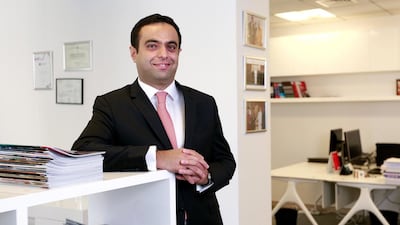Higher education in the UAE is going through a sea-change. Just last month it was announced that the prestigious American university, Stanford, had been appointed to advise on a new, more entrepreneurial and innovative undergraduate curriculum, to be introduced next month.
The move came as no surprise to Ehsan Razavizadeh. He has been promoting the attractions of a business-friendly higher education regime for the region, based in the UAE, for the past 15 years.
“My family was in business in Iran with interests in the UK and Germany. I went to study at Cass in the UK in 2000 and met some of the biggest names in British business, many of them alumni of the school. I began to think that something was missing from the ME business scene,” he says.
Cass is short for the Sir John Cass Business School, a constituent part of London’s City University and one of the most prestigious centres of business academia in the world. The list of alumni who have made it to senior positions in business, finance and commerce is a long one.
The school dates from 1966 but its heritage is centuries old, going back to an eponymous 18th-century grandee of London’s financial “square mile”. It is one of a comparatively small number of schools globally that is accredited for master of business administration degrees by American, British and European education authorities.
Mr Razavizadeh, who is the regional director for the Middle East and North Africa for Cass, saw the market, and the business opportunity, at an early stage.
“I wrote my postgraduate dissertation on the prospects for expansion of higher business education in the Middle East. It was really a business plan,” he concedes now.
In the aftermath of the invasion of Iraq in 2003, Cass was not sure the time was right in the region, so Mr Razavizadeh went off to work for London Business School until the call came in 2006 to revive the plan.
Dubai was the obvious choice. “We decided on Dubai because it is cosmopolitan, diverse and multicultural, rather like London in many ways. And the idea of a regional hub in the Dubai International Financial Centre was very appealing.
The DIFC is very like the City of London and the two have had a good relationship already, with visits by the Lord Mayor of London to Dubai and other formal and informal contacts,” he says.
In 2007, the first MBA course was launched from Cass’ “campus” – three floors of one of the Gate Village buildings in DIFC that it shares with its friendly rival, London Business School. “DIFC were very good as launch partners and really believed in the idea,” he says.
The first students were a 34-strong batch of mixed nationalities, including four Emiratis, which was “satisfying”, says Mr Razavizadeh.
“Equally pleasing was the fact that there were also students from London and New York, who wanted to study Islamic finance and had heard of the business potential of Dubai. They wanted to be where it was all happening and they saw Dubai as that place,” he says.
The school was one of the first of the leading international colleges to offer a specialism in Islamic finance, which he thinks is a big attraction for its executive MBA programme.
In recognition of the UAE’s position as a global air-travel hub it also offers three courses in aviation management in a City University master’s degree. Reflecting the importance of the airline business, Sheikh Ahmed bin Saeed Al Maktoum, the chairman of the Emirates Group, has an honorary doctorate from City University.
“In addition, there is the executive education programme, where we provide tailor-made courses, for example, in risk management and other financial courses. We also put on short courses – four days – in special subjects. We insist on a minimum of five years of work experience from a student,” Mr Razavizadeh says.
Now there are about 300 students, with essentially the same demographic as the original batch, each paying the course fee of £38,500 (Dh214,390).
This considerable outlay does not deter potential students.
“There is growing competition in the Middle East for business education, with about 100 MBAs on offer here. Just in the Gulf region it has got much more competitive, with LBS also in Dubai, Insead in Abu Dhabi and the American University of Sharjah all offering courses. But we think we have a competitive edge in finance and banking specialisms because that’s Cass’ traditional area of expertise. As well as aviation, of course,” says Mr Razavizadeh.
He has big expansion plans. For one thing, he would like to attract some full-time faculty members to live in the UAE and work in the school, instead of the current visiting staff of lecturers and professors.
“So far, it’s been difficult to attract that kind of superstar faculty members. They all seem to want to be near the research facilities in London. But it is an ambition to have full-time staff here eventually,” he says.
He also wants to expand in other subjects, such as engineering, law, health and even social sciences and arts that City University is famous for in the UK.
The university is one of the recognised centres of excellence in Europe for the postgraduate training of journalists and Mr Razavizadeh is in talks with big media organisations in the region to partner on vocationally orientated media courses with a view to offering postgraduate training in the profession.
In a society that values knowledge, and an economy that sets a premium on innovation and entrepreneurialism, Cass’ role can only get bigger.
fkane@thenational.ae
Follow The National's Business section on Twitter

